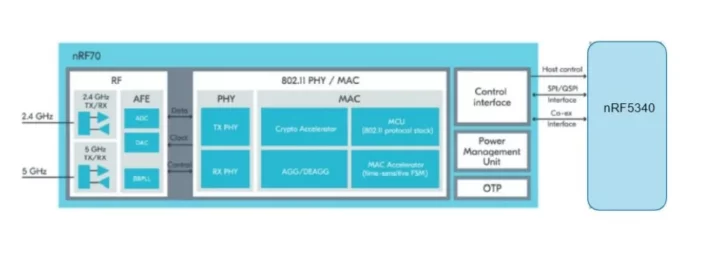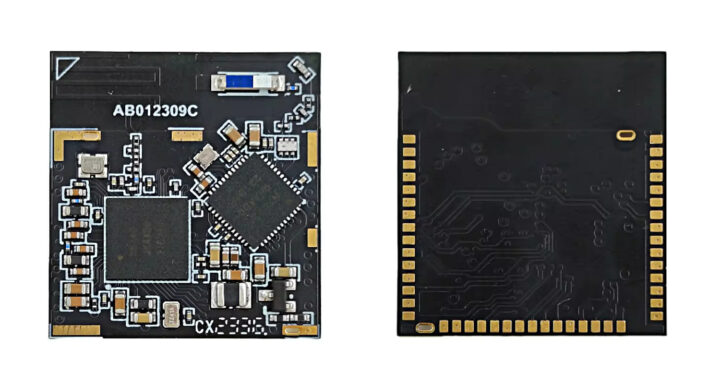Shenzhen-based Abluetech has launched two low-power wireless modules based on Nordic Semi nRF7002 and nRF5340 wireless chips. The PTR7002 is a dual-band WiFi 6 module based on the nRF7002 chip, and the PTR5302 module combines the nRF7002 with the nRF5340 wireless microcontroller to offer dual-band WiFi 6 and Bluetooth LE 5.4 connectivity
Abluetech PTR7002 dual-band WiFi 6 module with nRF7002
PTR7002 specifications:
- Chipset – Nordic Semi nRF7002
- Wireless
- Dual-band Wi-Fi 6
- Tx power – Up to +21dBm
- Rx sensitivity – -96.5dBm @ 2.4GHz / -90.5dBm @ 5GHz
- PHY bandwidth – Up to 86 Mbps (MCS7) 1SISO; 20MHz bandwidth
- Modes – Station, Wi-Fi Direct, Soft AP (Wi-Fi 4 operation only), simultaneous Station +Soft AP/Wi-Fi Direct/Station modes.
- 2.4GHz and 5GHz dual-band PCB antenna
- Range – Up to 300 meters
- Host interface – SPI / QSPI; AT command set
- Supply Voltage – 2.9 to 4.5V
- Power Consumption (@ 3.6V TBC)
- Tx peak current – ~165mA @ 2.4GHz +15dBm / ~244mA @ 5GHz +15dBm
- Rx peak current – ~60mA @ 2.4GHz / ~56mA @ 5GHz
- Deep Sleep Current – ~2μA
- Dimensions – 25.8 x 17.2mm

The PTR7002 WiFi 6 module is designed to interface with Nordic Semi’s nRF52 and nRF53 Series wireless SoCs and the nRF91 Series cellular IoT Systems-in-Package (SiPs), but it can also be used with other microcontrollers or application processors with a spare SPI or QSPI interface.
The PTR7002 module and nRF7002 WiFi 6 chipset are optimized for low power and suitable for home automation, smart lighting, and other loT devices with Matter, Bluetooth LE for commissioning, Thread for low power mesh, and Wi-Fi for high-throughput.
The manufacturer product page has limited information, but Nordic Semi’s developer website has plenty of resources to get started with nRF7002 software development. I first found the PTR7002 module on AliExpress where it is sold for $10.97 including shipping.
Abluetech PTR5302 dual-band WiFi 6 and Bluetooth LE 5.4 module
- SoC – Nordic Semi nRF5340 dual-core Arm Cortex-M33 Bluetooth 5.4 and multiprotocol SoC with 1MB flash and 512KB SRAM for the application core and 256KB flash and 64KB SRAM for the network core
- Chipset – Nordic Semi RF7002 dual-band WiFi 6 chips
- Wireless
- Dual-band Wi-Fi 6
- Tx power – Up to +21dBm or up to +19dBm depending on where one reads…
- Rx sensitivity – -96.5dBm @ 2.4GHz / -90.5dBm @ 5GHz
- PHY bandwidth – Up to 86 Mbps (MCS7) 1SISO; 20MHz bandwidth
- Modes – Station, Wi-Fi Direct, Soft AP (Wi-Fi 4 operation only), simultaneous Station +Soft AP/Wi-Fi Direct/Station modes.
- 2.4GHz and 5GHz dual-band PCB antenna
- Range – Up to 300 meters
- Bluetooth LE 5.4
- Bluetooth Mesh
- LE audio + Auracast support
- Tx power – +3dBm
- Rx sensitivity – -97.5 dBm @ BLE 1M
- 802.15.4 radio for Thread, Zigbee, 2.4GHz proprietary, ANT/ANT+
- Matter support
- Antennas
- WiFi – Ceramic antenna
- BLE – PCB antenna
- Dual-band Wi-Fi 6
- I/O – 34x GPIOs
- Supply Voltage
- BLE – 1.7 to 5.5V
- WiFi – 2.9 to 4.5V
- Power Consumption (@ 3.6V)
- Tx peak current – ~165mA @ 2.4GHz +15dBm / ~246mA @ 5GHz +15dBm
- Rx peak current – ~60mA @ 2.4GHz / ~56mA @ 5GHz
- Deep Sleep Current – ~4μA
- Dimensions – 23.5 x 23.5mm

The PTR5302 can be used as a standalone module thanks to the Cortex-M33 application core and should eventually be found in Smart Home devices, smart lighting, IoT gateways/bridges, wearables products, healthcare devices, and other IoT devices.
The product page has a few more details including a datasheet with the pinout and other information, but nothing about software. You can likely use the same documentation mentioned above for the official nRF7002 DK from Nordic Semi since it’s also based on an nRF5340 + nRF7002 design. The datasheet mentions a PTR5302-EVB with keys, LEDs, and I/O headers, but I was unable to find information about it. The PTR5302 module can be purchased on AliExpress for $15.40 shipped.
Those are the first third-party nRF7002 modules we cover on CNX Software, but the Nordic Semi’s website also lists modules from Fanstel and MinewSemi, besides the Abluetech models discussed in this article.

Jean-Luc started CNX Software in 2010 as a part-time endeavor, before quitting his job as a software engineering manager, and starting to write daily news, and reviews full time later in 2011.
Support CNX Software! Donate via cryptocurrencies, become a Patron on Patreon, or purchase goods on Amazon or Aliexpress






